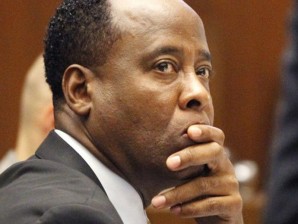
Dr.Conrad Murray sits in court during his trial in the death of pop star Michael Jackson in Los Angeles October 7, 2011. AFP PHOTO/POOL/Mario Anzuoni
LOS ANGELES – Michael Jackson’s doctor claimed he was trying to wean the singer off the drug that killed him, in a powerful blow-by-blow account of the star’s last hours and death played in court Friday.
In a police interview recorded days after the King of Pop’s 2009 death, Conrad Murray insisted he was away from Jackson’s bedside for only two minutes on June 25, 2009 when the star stopped breathing.
“Three days before his death, I started to wean Mr. Jackson from propofol,” Murray told investigators quizzing him over Jackson’s death, adding, “He was my friend, and he opened up to me in different ways, and I wanted to help him.”
But he said: “He fought me on it,” explaining how Jackson told him that previous doctors had helped him to sleep 15 to 18 hours at a stretch using propofol – a surgical anesthetic – to battle his chronic insomnia.
In the interview, taped two days after Jackson died on June 25, 2009, the 58-year-old doctor described spending an entire night trying in vain to get the star to sleep, with a series of drug injections.
Jackson had returned to his plush LA mansion from a rehearsal shortly after midnight, and Murray – who spent most nights there caring for the star – began with 2 mg of lorazapam, after a valium pill had no effect.
About an hour later he gave him a dose of another sedative, midazolam, but that also failed to put Jackson to sleep.
He suggested that Jackson meditate, to relax himself – and after a while he did fall asleep, only to wake up some 10 to 15 minutes later.
As 5:00 a.m. approached and Jackson was still “wide awake,” the star – who was paying Murray $150,000 dollars a month to look after him – began complaining that he would be unable to rehearse that day, he said.
“I’ve got to sleep, Dr. Conrad … You know I can’t function if I don’t get the sleep,” he quoted the singer as telling him, adding that gave him another dose of midazolam around 7:30 a.m.
Shortly after 10:00 a.m, and by this time “really complaining that he cannot sleep,” Jackson began asking for his “milk” – propofol, saying: “Please, please give me some milk, so I can sleep.”
At around 10:40 a.m he gave him 25 mg of propofol – which Jackson had had on a nightly basis for two months, before Murray started weaning him off it three nights before his death – and the singer went to sleep.
“I’m monitoring him … and he fell asleep,” said Murray. “I sat there, watched him for a long enough period that I felt comfortable .. Then I needed to go to the bathroom. So I got up, went to the bathroom.”
“I was gone I would say about two minutes .. Then I came back to his bedside and was stunned in the sense that he wasn’t breathing.”
Murray said he immediately started cardiopulmonary resuscitation (CPR) and mouth-to-mouth resuscitation.
After continuing those efforts for an unspecified time, he called Jackson’s personal assistant, Michael Amir Williams, who was not at the house but who alerted security guards outside to come up to the bedroom.
He said he did not immediately call 911 because he was working intensivly on trying to revive Jackson. “To speak to a 911 operator would be to neglect him,” he said.
Eventually another security guard arrived and called 911 at 12:20 p.m., before starting to help Murray pump Jackson’s chest. Paramedics arrived about six minutes later and continued efforts for about half an hour.
With no signs of life, doctors said they were ready to pronounce death at 12:57 p.m., but Murray insisted he be taken to the UCLA Medical Center – where the star was eventually pronounced dead at 2:26 p.m.